About
Join the team!
Would you like to become a collaborator of IMAGINES?
Just download, fill the form you will find below this message and send it to the following email address: This email address is being protected from spambots. You need JavaScript enabled to view it.. We will include your name, affiliation and any relevant links in our website and update you about events, conferences and news linked to our project and network.
adhesion-form-as-collaborator-imagines
Current collaborators:
AUSTRIA
-
Nicole Haitzinger, Professor in Art History, Music and Dance Studies, Paris Lodron Universität Salzburg
BELGIUM
-
Stefano Moschini, Degree in Classics and Film and Media, Degree in Education, Primary school teacher Brussels (Belgium)
BRAZIL
-
Maria Cecília de Miranda Nogueira Coelho is Associate Professor in Ancient Philosophy at the Universidade Federal de Minas Gerais (Brazil). She works on Greek Rhetoric and Dramatic Literature, specifically on Gorgias and Euripides. She is also specialised in the Reception of Greek Tragedy in Modern Theatre and Cinema, the Theory of image in Plato, and Classical patterns in the Sermons of the Jesuit Antonio Vieira. Her recent publications include contributions on Gender and Classics in the Western genre, and the Reception of Helen and Medea in films. She is the director of the Project Touching the Past in Brazil, which connects Greek material culture and Philosophy. Link to Academia. Link to CV Lattes.
-
Elaine Cristine Sartorelli, Professor of Classical Studies (Latin language and literature) at the Universidade de São Paulo – São Paulo (Brazil). She has extensively worked on the on the polemics on imitation in the 16th century (Erasmus against the Ciceronians). She is also interested in the reception of ancient narratives in cinema. Link to website. Link to profile.
FRANCE
-
Anne Bajard, Lecturer in Latin Language and Literature at the Université Bordeaux-Montaigne, member of the Research Institute Ausonius. She is an specialist in roman spectacles, imperial power and Roman art. Link to profile.
-
Tiphaine Annabelle Besnard, ATER (Attachée Temporaire d’Enseignement et de Recherche), LESA EA 3274, Aix-Marseille Université (France). Her research focuses on Antiquity in contemporary art (since the 80s), Member of Antiquipop
-
Fabien Bièvre-Perrin, Postdoctoral fellow at LabexMed/Gerda Henkel, IRAA (USR 3155 CNRS/AMU) (France), Member of Antiquipop
GERMANY
-
Alejandro Cadenas González, teaching fellow in Ancient History at the Universität Potsdam. His Phd (Potsdam 2021) focuses on the divine image of the emperor in the Theodosian period. More generally, his research revolves around the imperial cult, religious image of Roman emperors, and Roman art. He is also interested in modern echoes of imperial ideas, in particular in the uses of ancient ideas of monarchy, republic and empire in fantasy and science fiction sagas such as Star Wars, Dune, The Whitcher and Warhammer 40.000. Link to website. Link to profile.
-
Pasquale Ferrara, teaching fellow in Ancient History at the Universität Potsdam. He holds a PhD in Classical Archaeology by the Università Roma Tor Vergata and writes currently his second PhD in Ancient History at Potsdam. Pasquale's research focuses on gender and women studies. He has extensively studied the representation of the Maenads or Bacchae in ancient art and is now working on the reception of ancient Maenads in pop culture, specially in comics and video games. Pasquale is also interested in "Dionysian personas" in modern reception. His publications include Mainàs. Studi sulle menadi nella statuaria greca e romana (IRAW, 8) (Roma 2020) (monograph); Baccanti ebbre e ninfomani tra la fine della Repubblica e la prima età imperiale, Graeco-Latina Brunensia 28, 1 (2023), 19–31. Link to profile
-
Christian Rollinger, Lecturer in Ancient History at the University of Trier. He is specialised in the late Roman republic and Late Antiquity, an is interested in Classical receptions throughout ‘new’ and digital media, in particular in historical video games. Link to website
-
Yvonne Vosmann, PhD student at the Georg-August-University Göttingen (Germany). Specialised in Egyptology
ITALY
-
Domitilla Campanile, Associate professor at the Università di Pisa (Italy). Specialised in Roman History, she also works on historical films and on the reception of the Roman Empire in modern popular culture, link to website
-
Maria G. Castello, Lecturer at the Università di Torino (Italy). Ancient Historian specialised in Late Antiquity. Specialised in manga, anime and their connections with the Classical World, link to website
-
Morena Deriu, Università degli Studi di Cagliari. Lecturer specialised in Ancient Greek Literature and interested in the Reception of Classics in comics and contemporary cinema and literature. Her published works include an article in the journal Ítaca on Amazons, Wonder Woman and gender identity in cinema and comics. Link to website and further publications
-
Genevieve Gessert, Director of General Education, Associate Professor & Interim Director of the Archaeology and Classics Program, The American University of Rome (Italy). Specialist in Classical Receptions, specially comics and cinema, link to website
POLAND
-
Małgorzata Budzowska, Assistant Professor at the University of Łódź (Poland). Her research is mainly focused on the reception of ancient myths in contemporary theatre. I cooperate with the APGRD (University of Oxford) and Jocasta. Classical Reception Greece. Link to website
SPAIN
-
Oskar Aguado, Researcher at the University of que Basque Country and secondary school teacher, Vitoria (Spain), Ancient Historian specialised in Classical Receptions in Cinema, member of ANIHO.
-
Ainize González, Assistant-Curator at the Museum of World Cultures, Barcelona (Spain). Phd in Art History and Musicology, specialised in 20th century art, link to website
-
Ana González-Rivas Fernández, Senior Lecturer in English Studies at the Universidad Autónoma de Madrid. She works on Anglo-American Gothic and Fantastic Literature, Comparative Literature, Myth Criticism and Reception Studies. Her PhD thesis (2010), explored the connections between Greco-Latin literature and Anglo-American Gothic Literature (book 2011, available open-access). In recent years, she has focused more specifically on the receptions of myth and its study from the perspective of Myth Criticism. Ana is particularly interested in the reception of Classics in popular culture, including literature, comic books, and films. Currently she is the secretary of the SELGyC (Spanish Association of Comparative Literature), the secretary of Asteria (International Association of Myth Criticism) and a member of the Governing Board of the EAPSA (Edgar Allan Poe Spanish Association). Along with her academic work, she has taken part in the organisation of some cultural events, such as the Madrid Gothic Week and a number of activities related to the Madrid Science Week. Her publications also include “Somnium Imago Mortis. Classical Myth in the Pre-Raphaelite Painting”, The International Journal of the Humanities: Annual Review 11 (2013), 35-50; “Reconstructing the Myth of Lamia in Modern Fiction: Stories of Motherhood, Miscarriage, and Vengeance." The International Journal of the Humanities: Annual Review 16:1 (2018), 25-38; “From Myth to Comic: Rayco Pulido’s Lamia”. Journal of Comics and Graphic Novels (2022); “De madre a monstruo: claves estéticas (y éticas) para la recepción del mito de Lamia en la modernidad”, in: En los márgenes del mito: Hibridaciones de la mitología clásica en la cultura de masas contemporánea, ed. Luis Unceta and Helena González (Editorial Los libros de la Catarata / Universidad Autónoma de Madrid), 2022, 61-84. Link to website and profile
-
Alberto P. Martí, Madrid (Spain), Phd in Archaeology by the University of Nottingham. Director of ArkeoPlanet
-
Emilia Mataix Ferrándiz, Maria Zambrano fellow at the University of the Basque Country (Spain), previously at University of Helsinki and at the Käte Hamburger kolleg Münster. She works on Roman Law, maritime trade and the economy, and is the author of Shipwrecks, Legal Landscapes and Mediterranean Paradigms: Gone under Sea (Brill 2022). She collaborates with the research project Structural Determinants of Economic Performance in the Roman World, the ERC Project “Spaces of Roman Republicanism” and the Centre of Excellence in Law, Identity and the European narratives. She is one of the coordinators of the Research network ‘Engendering Ancient Economies’, and of the research cluster Down by the water. Global Conversations in Maritime Archaeology. She is very interested in the reception of Classics in comics and in the uses of antiquity in the branding and marketing strategies of the food industry. Link to profile and publications.
-
Montserrat Reig Calpe, Classical Philologist, Research Fellow at ICAC, Tarragona and lecturer at Institut Joanot Martorell, Esplugues del Llobregat, Barcelona (Spain). She works mostly on Classical Receptions in 20th and 21st centuries Theater and Opera.
-
Alejandro Valverde García, Classical Filologist and teacher at the Instituto Santísima Trinidad / Baeza, Jaén (Spain). He has extensively worked on Classics and Cinema, with special focus on Ancient Greek Tragedy in Screen.
SOUTH AFRICA
-
Michela Piccin, Assyriologist working on Ancient Near East cultures, languages and their reception. Currently at the Faculty of Theology of the North-West University in South Africa. She was previously lecturer at the Institute of Ancient Civilisation, Northeast Normal University, Changchun (China). Her publications include the monograph Linguistic Aspects of Persuasiveness in Akkadian: Pettitions and Prayers (Berlin 2021), and the articles Assyrian Treaties: "Patchwork Texts", Journal of Ancient Civilization 35.1, 2020, 33-70, and Mortality and Fame in Akkadian Texts, Journal of Ancient Civilizations 33.1, 2018, 1-25. Michela was also organiser of the public event Gilgamesh in 12 Hours (Changchun 2018), a theatrical dramatisation of the epic poem accompanied by live music exclusively created for the event. Link to profile
UNITED KINGDOM
-
Richard Cole, University of Bristol. Research Associate in Ancient Greek History and Virtual Reality. He works on Virtual Antiquity and on the AHRC-funded Project ‘The Virtual Reality Oracle (VRO): An Immersive Experience of the Ancient Greek Oracle at Dodona,’. He is interested in design and video games and multimedia. Link to the VRO website. Link to profile
-
Joyce Datiles, Research Associate, Dept. of Greek & Latin at UCL. Dual doctorate in Ancient History and Anthropology in UCL. Film director and writer. Research on ancient battles as well as the aesthetics and concepts of heroism, both in history and on screen. She is cofounder of the production company The Spectacle Makers Productions. She is one of 10 emerging female filmmakers selected for Creative England´s inaugural Industry Equals: Women in Screen 2020. She is author of the historical drama Sceptre (2020), the historical fantasy series Moon Fight (2020) and the forthcoming To See the Corpse Alive. Link to website
-
Penny Goodman, Associate Professor in Classics at the University of Leeds (UK). Specialised in Roman history; Roman urbanism; the emperor Augustus and his post-classical afterlives. link to website
-
Ersin Hussein, Swansea University (Wales, UK), Teaching Associate Roman History with focus on ancient Cyprus
-
Silke Knippschild, Senior Lecturer in Ancient History at the University of Bristol (UK). Her work focuses on intercultural relations and cross-cultural influences between Ancient Western Asia, Greece, and Rome. Cofounder of Imagines, organiser and co-editor of Seduction and Power.
-
Athena S. Leoussi, Associate Professor in European History / Cultural Historian with a focus on the visual arts. She is interested and has extensively worked in the following research areas: Classicism in 19th-century art in England and France; Classicism and Nationalism – the nationalisation of the Classical Tradition in 19th and 20th c Europe; the reception of the Classical physical ideal/the Greek body in 19th and early 20th centuries Europe; Classicism in modern political architecture. Her publications include: Leoussi, A. (2020) ‘La formation d’une identité Européenne’. In Davion, Isabelle and Heuser, Beatrice (eds.) Batailles: Une Histoire des Grands Mythes Nationaux Paris: Belin, 21-32; Leoussi, A. (2020) ‘Art, architecture and nationalism’. In: Greenfeld, L. and Wu, Z. , (eds.) Research Handbook on Nationalism. Edward Elgar, Oxford; Leoussi, A. (2018) ‘Making everyone Greek: citizens, athletes, and ideals of nationhood in nineteenth-century Britain, France, and Germany’. In: Harloe, K. , Momigliano, N. , Farnoux, A. , (eds.) Hellenomania. Routledge, London, 100-125; Leoussi, A. (2018) ‘Famous battles and their after-life: a framework’. In: Heuser, B. and Leoussi, A. , (eds.) Famous Battles and How They Shaped the Modern World c.1200 BCE - 1302 CE: From Troy to Courtrai, vol.1. Barnsley (UK): Pen and Sword, 1-19.
-
Amanda Potter, Visiting Fellow at the Open University. Her research research interests include classics in film and television and creative engagement with the ancient world via creative writing. She has published on Wonder Woman, Doctor Who, Game of Thrones, HBO Rome, Starz Spartacus, BBC Atlantis, Xena: Warrior Princess, Charmed and Buffy the Vampire Slayer. She is co-editor (with Hunter Gardner) of Ancient Epic on Film and Television, (EUP, forthcoming December 2021). Link to profile and website
UNITED STATES
-
Jim Cogswell, Arthur F. Thurnau Professor of Art & Design at the Stamps School of Art & Design, and Affiliated member of the Department of Classical Studies of University of Michigan, Ann Arbor. Jim is also a visual artist. His public art projects are based on his research into artifacts from Antiquity in museum collections. These projects have also set to multiple series of drawings and paintings on paper. His installations include “Cosmogonic Tattoos” (Ann Arbor 2017); “Vinyl Euripides” (Cacoyannis Foundation, Athens 2022); “Hands, Nets, and Other Devices”(International Museum of Contemporary Sculpture, Santo Tirso, Portugal 2023). To find more about his work, see jimcogswell.com. Link to profile
-
Thomas E. Jenkins, Trinity University, Sant Antonio, Texas (US). Professor of Classics interested in the reception of Antiquity in contemporary media, including novels, theater, and video games. Link to website
-
Giacomo Loi, PhD candidate in Classics, Johns Hopkins University (Baltimore, US). He works on the reception of classical culture in Modern Hebrew culture (literature, cinema, figurative arts), on Italian Renaissance culture and Italian Jewish culture. Currently researching on the representation of Romans in pre-Israeli Jewish cinema. Link to website.
-
Michael Seymour, Assistant Curator at the Metropolitan Museum of Art, Ancient Near and Eastern Art, New York (US). He works foremost on Ancient Babylon and its modern visual receptions. Link to website
Dr Martina Treu, Imagines Coordinator
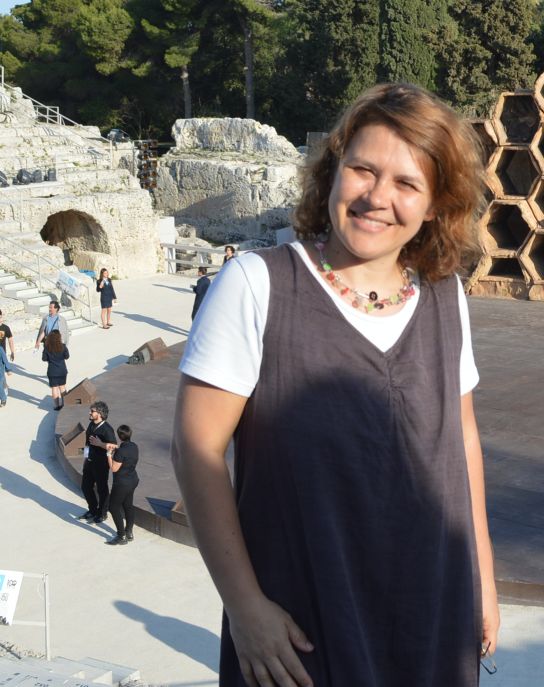 Martina Treu is Senior Assistant Professor in Greek Language and Literature at IULM University (Milan, Italy) since 2008, and she is coordinator and speaker of the Imagines Project since 2016. She is also founder and member of CRIMTA – University of Pavia. She graduated at Pavia University and she completed her PhD in Classical Philology at Padova University. She achieved the periodic National Examination as Associate Professor in Greek Language and Literature, Classical Philology and History of Greek and Roman Theatre.
Martina Treu is Senior Assistant Professor in Greek Language and Literature at IULM University (Milan, Italy) since 2008, and she is coordinator and speaker of the Imagines Project since 2016. She is also founder and member of CRIMTA – University of Pavia. She graduated at Pavia University and she completed her PhD in Classical Philology at Padova University. She achieved the periodic National Examination as Associate Professor in Greek Language and Literature, Classical Philology and History of Greek and Roman Theatre.
Her main research area is classical reception, adaptation and performance of Greek Drama. She has been Visiting Assistant Professor in Drama at the University of Venice and at the Catholic University, Brescia. She has worked in many Italian and European theatres and cooperated to a few adaptations of classical texts for the stage.
Among her publications are: Undici cori comici, Genova 1999; Cosmopolitico, Milano 2005; La Mitologia a test, Milano 2008; La mythologie, Paris, 2009; Il teatro antico nel Novecento, Roma 2009; Emilio Isgrò, L’Orestea di Gibellina e gli altri testi per il teatro, ed.by M. Treu, Firenze, 2011; Ajax, in Brill’s Companion to the Reception of Sophocles, ed. by R. Lauriola and K. Demetriou, Leiden / Boston 2017: 27-76; Ulysses’ Journey and Homer’s Odyssey, an eternal return, in The Eternal Return: Myth Updating in Contemporary Literature, ed.by A. González-Rivas –A. Lipscomb, JCLA, Journal of Comparative Literature and Aesthetics, issue 40.2, 2017: 103-122; Classics “the “Italian Way” a Long-Standing Paradox, in Echoing Voices in Italian Literature: Tradition and Translation in the 20th Century , ed. by T. Franco and C. Piantanida, Cambridge Scholar Press, 2018: 100-119; La Platea del Consenso, Stratagemmi. Prospettive teatrali, n. 38-39 (2/2018-1/2019), ed.by M. Treu: 97-112; “Erase and Rewrite. Ancient Texts, Modern Palimpsests”, in Skenè. Journal of Theatre and Drama studies, vol.5 n.2 (2019): 176-201; A lezione di regia teatrale. Conoscere lo spettacolo teatrale attraverso il racconto degli allestimenti, Issues 2-4, Milano, 2021-2022, Contemporaneo classico. Dialoghi tra antico e moderno nel nuovo Millennio, Milano 2022; Metamorfosi del trauma e violenza tragica, in Altre Modernità, ed. by R. Boccali, M. Treu, L. Scarabelli, E. Perassi, 2022: 65-81 (Open Access); Incense on the grass. A ‘strongly perfumed’ Libation Bearers (1999), in The Smells and Senses of Antiquity in the Modern Imagination: The Fragrant and the Foul, ed. by A. Grand-Clément and C. Ribeyrol, Imagines Series, Bloomsbury, 2022: 224-242; Tras las huellas de los sátiros: híbridos en la escena, in En los márgenes del mito. Hibridaciones del mito griego en la cultura de masas contemporánea, ed. by L. Unceta Gómez & H. González Vaquerizo, Catarata/Ediciones de la UAM, 2022: 105-128; Non solo Orfeo: Buzzati e i classici, in Dino Buzzati e la parola. Forme e linguaggio, ed by Silvia T. Zangrandi, Pisa-Roma, Serra editore, 2022: 189-199; Eschilo in Sicilia: l’Agamènnuni di Isgrò - Pirrotta (1983-2021), in Agamennone Classico e contemporaneo, ed. by Alessandro Iannucci, Francesco Citti, Antonio Ziosi, Collana “Lexis - Supplementi” Venezia, Edizioni Ca’ Foscari, 2022: 243-254 (Open Access); I teatri di Milano e la memoria ritrovata, in Milano tra memoria e ricordo, identità e immaginario, distruzione e ricostruzione, ed. by P. Giovannetti and S. Moretti, Milano-Udine, Mimesis Edizioni, 2022 (Ricerche IULM. Comunicazione, arti e media, 12), pp.133-159; “Un battito di ciglia. La bellezza come antidoto alla guerra”, in Quaderni camilleriani/19. Fìmmine (…ci vogliono occhi per taliarle), ed.by M. Deriu, Cagliari, Grafiche Ghiani, 2023, pp.62-83 (Open Access).
Contact: Email: This email address is being protected from spambots. You need JavaScript enabled to view it.; This email address is being protected from spambots. You need JavaScript enabled to view it.
Dr Anastasia Bakogianni
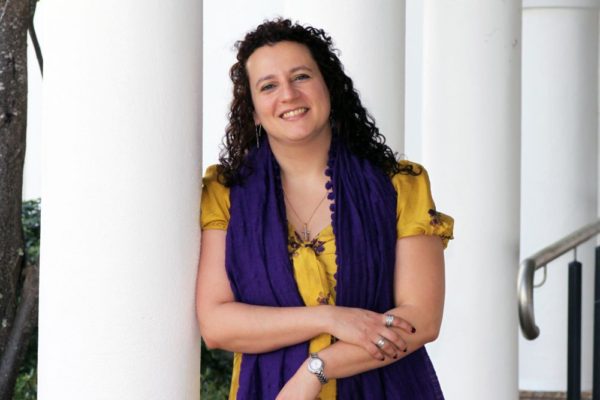 Dr Anastasia Bakogianni is Senior Lecturer in Classical Studies at Massey University in New Zealand. She received her PhD from the University of London (2004) and worked as a Research Fellow at the Institute of Classical Studies of the School of Advanced Studies, University of London (2005-9). She returned to the Institute as a Research Associate (2013-15). In between she held a two-year British Academy post-doc fellowship at The Open University, followed by a fixed-term lectureship and taught Classics at several universities. Her book Electra Ancient and Modern: Aspects of the Reception of the Tragic Heroine examined Electra’s portrayal in Greek tragedy and established the importance of mourning as a key strand in her many post-classical metamorphoses. Dr Bakogianni is also the editor of three collections Dialogues with the Past: Reception Theory and Practice (2013), War as Spectacle: Ancient and Modern Perspective on the Display of Armed Conflict (co-edited with V. M. Hope, 2015) and Locating Classical Receptions on Screen: Masks, Echoes, Shadows (co-edited with R. Apostol, 2018).
Dr Anastasia Bakogianni is Senior Lecturer in Classical Studies at Massey University in New Zealand. She received her PhD from the University of London (2004) and worked as a Research Fellow at the Institute of Classical Studies of the School of Advanced Studies, University of London (2005-9). She returned to the Institute as a Research Associate (2013-15). In between she held a two-year British Academy post-doc fellowship at The Open University, followed by a fixed-term lectureship and taught Classics at several universities. Her book Electra Ancient and Modern: Aspects of the Reception of the Tragic Heroine examined Electra’s portrayal in Greek tragedy and established the importance of mourning as a key strand in her many post-classical metamorphoses. Dr Bakogianni is also the editor of three collections Dialogues with the Past: Reception Theory and Practice (2013), War as Spectacle: Ancient and Modern Perspective on the Display of Armed Conflict (co-edited with V. M. Hope, 2015) and Locating Classical Receptions on Screen: Masks, Echoes, Shadows (co-edited with R. Apostol, 2018).
Contact: This email address is being protected from spambots. You need JavaScript enabled to view it.
Dr Irene Berti
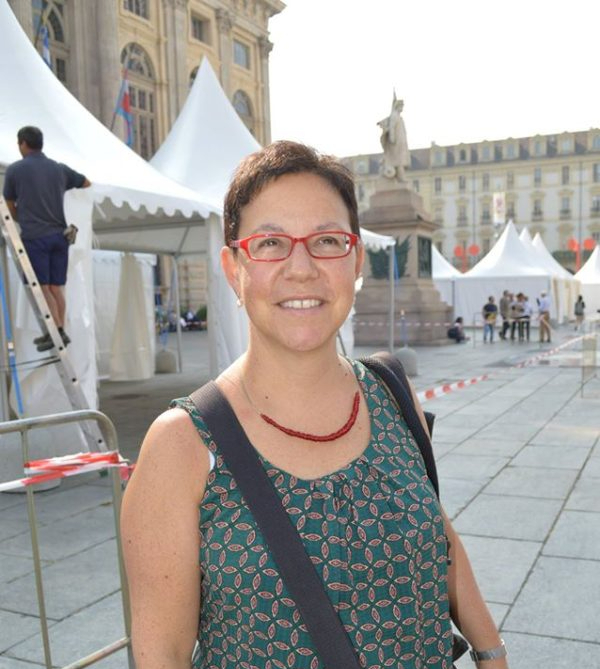 Irene Berti is lecturer at the Pädagogische Hochschule Heidelberg. After her studies of Classical Archaeology, Classical Philology and Ancient History in Rome, Athens and Heidelberg, she has been foreign expert for Greek History and Faculty member at the University of Changchun (China), lecturer in Heidelberg and in Gießen and held postdoc positions in Heidelberg and in Torino, where she worked on epigraphic projects. Her main research interests are Greek religion and mythology, ancient technology and reception of ancient myths. Together with Marta Garcia Morcillo she published Hellas on screen (Steiner Verlag 2008). She is also co-editor (with Filippo Carla) of Ancient Magic and the Supernatural in the Modern Visual and Performing Arts (Imagines Series, Bloomsbury 2015), and of Ancient Violence in the Modern Imagination: The Fear and the Fury (Imagines Series, Bloomsbury, paperback 2022) (with Carla Scilabra and Maria-Goretti Castello). Since 2008 she is an enthusiastic member of the imagines-Project.
Irene Berti is lecturer at the Pädagogische Hochschule Heidelberg. After her studies of Classical Archaeology, Classical Philology and Ancient History in Rome, Athens and Heidelberg, she has been foreign expert for Greek History and Faculty member at the University of Changchun (China), lecturer in Heidelberg and in Gießen and held postdoc positions in Heidelberg and in Torino, where she worked on epigraphic projects. Her main research interests are Greek religion and mythology, ancient technology and reception of ancient myths. Together with Marta Garcia Morcillo she published Hellas on screen (Steiner Verlag 2008). She is also co-editor (with Filippo Carla) of Ancient Magic and the Supernatural in the Modern Visual and Performing Arts (Imagines Series, Bloomsbury 2015), and of Ancient Violence in the Modern Imagination: The Fear and the Fury (Imagines Series, Bloomsbury, paperback 2022) (with Carla Scilabra and Maria-Goretti Castello). Since 2008 she is an enthusiastic member of the imagines-Project.
Contact: This email address is being protected from spambots. You need JavaScript enabled to view it.
Prof. Dr. Filippo Carlà-Uhink
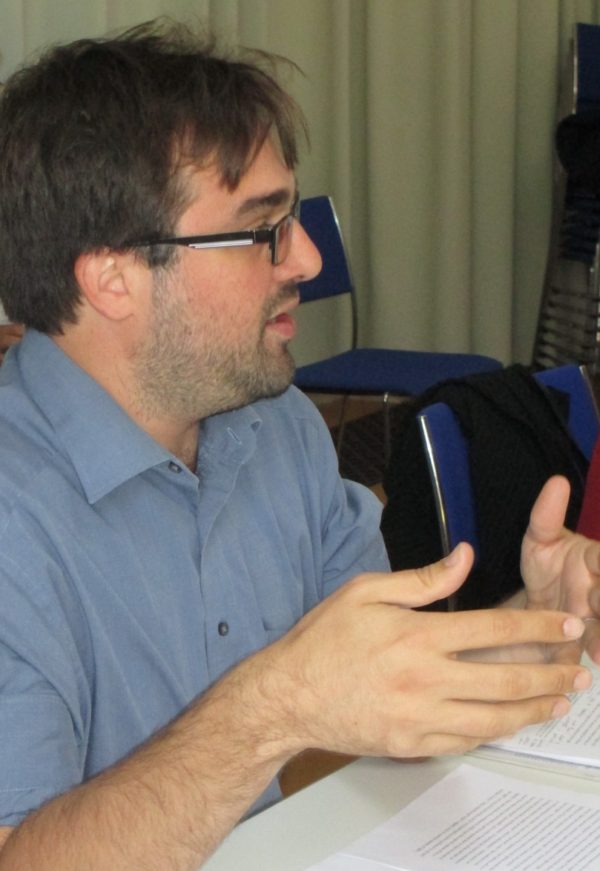 Filippo Carlà-Uhink is Professor for Ancient History at the University of Potsdam in Germany. He received his PhD from the University of Udine, Italy in 2007 and worked at the Universities of Heidelberg, Mainz, Exeter and at the University of Education Heidelberg before being appointed to Potsdam in 2018. In 2012, he organized together with Irene Berti in Mainz the third international Imagines conference, “Magic and the Supernatural from the Ancient World” (which became in 2015 a collective volume for Bloomsbury); in 2014 he edited a collective volume on the reception of classical Antiquity in European comics (Caesar, Attila & Co., Von Zabern, Darmstadt 2014). He is one of the editors of the open access journal thersites (in which he co-edited with Marta García Morcillo and Christine Walde in 2017 a monographic number on Advertising Antiquity), and together with Martin Lindner editor of the Imagines series for Bloomsbury. He has published many articles and book chapters on the reception of Classical Antiquity, especially in the modern popular culture and in modern political discourses. He is the author of the monograph Representations of Classical Greece in Theme Parks (Imagines series, Bloomsbury 2020), and he edited, with Anja Wieber, the collective volume Orientalism and the Reception of Powerful Women from the Ancient World (Imagines series, Bloomsbury 2020). He is the organizer, together with Luis Unceta Gómez, of the eighth international Imagines conference, Pagan Pornotopias (Madrid 2023). In July 2023, he organised the workshop Greek and Roman Antiquity for Children and Young Adults at the Universität Potsdam.
Filippo Carlà-Uhink is Professor for Ancient History at the University of Potsdam in Germany. He received his PhD from the University of Udine, Italy in 2007 and worked at the Universities of Heidelberg, Mainz, Exeter and at the University of Education Heidelberg before being appointed to Potsdam in 2018. In 2012, he organized together with Irene Berti in Mainz the third international Imagines conference, “Magic and the Supernatural from the Ancient World” (which became in 2015 a collective volume for Bloomsbury); in 2014 he edited a collective volume on the reception of classical Antiquity in European comics (Caesar, Attila & Co., Von Zabern, Darmstadt 2014). He is one of the editors of the open access journal thersites (in which he co-edited with Marta García Morcillo and Christine Walde in 2017 a monographic number on Advertising Antiquity), and together with Martin Lindner editor of the Imagines series for Bloomsbury. He has published many articles and book chapters on the reception of Classical Antiquity, especially in the modern popular culture and in modern political discourses. He is the author of the monograph Representations of Classical Greece in Theme Parks (Imagines series, Bloomsbury 2020), and he edited, with Anja Wieber, the collective volume Orientalism and the Reception of Powerful Women from the Ancient World (Imagines series, Bloomsbury 2020). He is the organizer, together with Luis Unceta Gómez, of the eighth international Imagines conference, Pagan Pornotopias (Madrid 2023). In July 2023, he organised the workshop Greek and Roman Antiquity for Children and Young Adults at the Universität Potsdam.
Contact: This email address is being protected from spambots. You need JavaScript enabled to view it.
Dr Jesús Carruesco
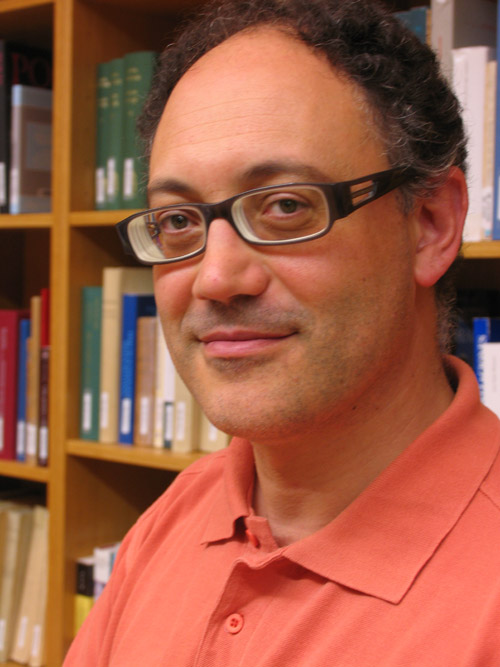 Jesús Carruesco is Profesor of Classical Philology at the University Rovira i Virgili (Tarragona), as well as senior researcher of the Catalan Institute of Classical Archaeology (ICAC). He is specialist in Greek Culture and Literature, particularly lyric, and iconography, as well as in ancient theatre and its modern receptions, including contemporary opera. Jesús leads currently the international Project Mechanisms of Representation of the Past and Dynamics of Performance in Ancient Greece (I+D FFI2015-68548-P) (2016-19). Previously, he was PI of the project The Articulation of Space in Ancient Greece and Egypt. His most recent publications include: Ancient Seas in Modern Opera: Sea Images and Mediterranean Myths in Rihm’s Dionysos, in: Rovira, C., Sailing in Troubled Waters, Bloomsbury, London 2017: 148-169 (with M. Reig); The Invention of Stesichorus: Hesiod, Helen, and the Muse, in: Bakker, E. (ed.), Authorship and Greek Song: Authority, Authenticity, and Performance, Mnemosyne Supplements, Brill, Leiden, Boston 2017: 178-196; Choral Performance and Geometric Patterns in Epic Poetry and Iconographic Representations, in: The Look of Lyric: Greek Song and the Visual, Mnemosyne, Supplements 391, Brill, Leiden 2016: 69-107; Medea, a Greek Sorceress in Modern Opera and Ballet: From Barber to Reimann, in: Carlà, F.; Berti, I. (eds.), Ancient Magic and the Supernatural in the Modern Visual and Performing Arts, Bloomsbury Studies in Classical Reception, Bloomsbury, London 2015: 93-102 (with M. Reig); and Redefining Catharsis in Opera: Myth and the Power of Music in Birtwistle’s The Minotaur and Amargós’ Eurídice y los títeres de Caronte, in: a Knippschild, S.; Garcia Morcillo, M. (eds.), Seduction and Power: Antiquity in the Visual and Performing Arts, Bloomsbury Academic, London-New York-New Delhi-Sydney 2013: 109-120 (with M. Reig).
Jesús Carruesco is Profesor of Classical Philology at the University Rovira i Virgili (Tarragona), as well as senior researcher of the Catalan Institute of Classical Archaeology (ICAC). He is specialist in Greek Culture and Literature, particularly lyric, and iconography, as well as in ancient theatre and its modern receptions, including contemporary opera. Jesús leads currently the international Project Mechanisms of Representation of the Past and Dynamics of Performance in Ancient Greece (I+D FFI2015-68548-P) (2016-19). Previously, he was PI of the project The Articulation of Space in Ancient Greece and Egypt. His most recent publications include: Ancient Seas in Modern Opera: Sea Images and Mediterranean Myths in Rihm’s Dionysos, in: Rovira, C., Sailing in Troubled Waters, Bloomsbury, London 2017: 148-169 (with M. Reig); The Invention of Stesichorus: Hesiod, Helen, and the Muse, in: Bakker, E. (ed.), Authorship and Greek Song: Authority, Authenticity, and Performance, Mnemosyne Supplements, Brill, Leiden, Boston 2017: 178-196; Choral Performance and Geometric Patterns in Epic Poetry and Iconographic Representations, in: The Look of Lyric: Greek Song and the Visual, Mnemosyne, Supplements 391, Brill, Leiden 2016: 69-107; Medea, a Greek Sorceress in Modern Opera and Ballet: From Barber to Reimann, in: Carlà, F.; Berti, I. (eds.), Ancient Magic and the Supernatural in the Modern Visual and Performing Arts, Bloomsbury Studies in Classical Reception, Bloomsbury, London 2015: 93-102 (with M. Reig); and Redefining Catharsis in Opera: Myth and the Power of Music in Birtwistle’s The Minotaur and Amargós’ Eurídice y los títeres de Caronte, in: a Knippschild, S.; Garcia Morcillo, M. (eds.), Seduction and Power: Antiquity in the Visual and Performing Arts, Bloomsbury Academic, London-New York-New Delhi-Sydney 2013: 109-120 (with M. Reig).
Contact: This email address is being protected from spambots. You need JavaScript enabled to view it.
Prof. Pepa Castillo Pascual
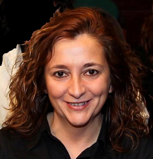 Pepa Castillo Pascual is Professor for Ancient History at Universidad de la Rioja and Senior Fellow of the interdisciplinary project Topoi (The Formation and Transformation of Space and Knowledge in Ancient Civilizations). She studied ancient history and classics in Madrid and Vitoria. In 1993 she received a doctorate with a thesis on roman spatial planning from Universität Heidelberg and Universidad de la Rioja. Since then her research focuses on the study of roman spatial planning and gromatic works. Furthermore she investigates the history of Constantine the Great of whom she wrote a monography (2010). She is founder member of Imagines-Project and has extensively worked on the reception of antiquity in Baroque opera. Her Classical Reception contributions include the co-edition of the first Imagines volume, and the articles Claudia Quinta and Publius Cornelius Scipio Nassica: Exempla virtutis in Vienna under Leopold I (1675-1705), in: Silke Knippschild and Marta García Morcillo (eds.), Seduction and Power. The Antiquity in the Visual and Performing Arts, London: Bloomsbury 2013, 155-169; and Circe diva: The Reception of Circe in the Baroque Opera (XVII Century), in F. Carlà and I. Berti, Magic and the Supernatural in the Modern Visual and Performing Arts, Bloomsbury 2015.
Pepa Castillo Pascual is Professor for Ancient History at Universidad de la Rioja and Senior Fellow of the interdisciplinary project Topoi (The Formation and Transformation of Space and Knowledge in Ancient Civilizations). She studied ancient history and classics in Madrid and Vitoria. In 1993 she received a doctorate with a thesis on roman spatial planning from Universität Heidelberg and Universidad de la Rioja. Since then her research focuses on the study of roman spatial planning and gromatic works. Furthermore she investigates the history of Constantine the Great of whom she wrote a monography (2010). She is founder member of Imagines-Project and has extensively worked on the reception of antiquity in Baroque opera. Her Classical Reception contributions include the co-edition of the first Imagines volume, and the articles Claudia Quinta and Publius Cornelius Scipio Nassica: Exempla virtutis in Vienna under Leopold I (1675-1705), in: Silke Knippschild and Marta García Morcillo (eds.), Seduction and Power. The Antiquity in the Visual and Performing Arts, London: Bloomsbury 2013, 155-169; and Circe diva: The Reception of Circe in the Baroque Opera (XVII Century), in F. Carlà and I. Berti, Magic and the Supernatural in the Modern Visual and Performing Arts, Bloomsbury 2015.
Contact: This email address is being protected from spambots. You need JavaScript enabled to view it.
Prof. Antonio Duplá-Ansuategui
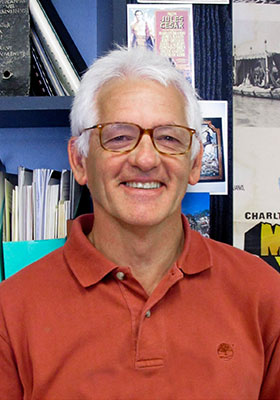 Antonio Duplá-Ansuategui is Professor of Ancient History at the University of the Basque Country (Vitoria-Gasteiz). His research focuses on two major areas, social conflicts and political violence in the Late Roman Republic and historiography and classical receptions. In this second field, he has worked on modern historiography (Mommsen, Marxism), Ancient Rome on screen, historical painting and in particular on classicism, fascism and Francoism. Some of his recent publications include: Augusto y el franquismo: ecos del Bimilenario de Augusto en España, Revista de historiografía 27, 2017; The image of Phoenicians and Carthaginians in Modern Spanish History and Culture, in R. Rovira (ed.), The Ancient Mediterranean Sea in Modern Visual and Performing Arts, Bloomsbury, 2018; with E. dell’Elicine and J. Pérez Mostazo (eds.), Antigüedad clásica y naciones modernas en el Viejo y el Nuevo Mundo, Madrid, Polifemo, 2018; Marco Antonio, un imperator venido a menos en la pantalla, in B. Antela-Bernárdez / J.Vidal (eds.), La guerra de la Antigüedad en el cine, Zaragoza, 2019; Ancient War and Modern Art: Some Remarks on Historical Painting from the Nineteenth and Twentieth Centuries, in I. Berti, Mª G. Castello, C. Scilabra (eds.), Ancient Violence in the Modern Imagination. The Fear and the Fury, Bloomsbury 2021; with A. Emborujo and O. Aguado (eds.), Del clasicismo de elite al clasicismo de masas, Madrid, Polifemo, (forthcoming). He is the PI of the project and network ANIHO: Antigüedad, nacionalismos e identidades complejas en la historiografía occidental.
Antonio Duplá-Ansuategui is Professor of Ancient History at the University of the Basque Country (Vitoria-Gasteiz). His research focuses on two major areas, social conflicts and political violence in the Late Roman Republic and historiography and classical receptions. In this second field, he has worked on modern historiography (Mommsen, Marxism), Ancient Rome on screen, historical painting and in particular on classicism, fascism and Francoism. Some of his recent publications include: Augusto y el franquismo: ecos del Bimilenario de Augusto en España, Revista de historiografía 27, 2017; The image of Phoenicians and Carthaginians in Modern Spanish History and Culture, in R. Rovira (ed.), The Ancient Mediterranean Sea in Modern Visual and Performing Arts, Bloomsbury, 2018; with E. dell’Elicine and J. Pérez Mostazo (eds.), Antigüedad clásica y naciones modernas en el Viejo y el Nuevo Mundo, Madrid, Polifemo, 2018; Marco Antonio, un imperator venido a menos en la pantalla, in B. Antela-Bernárdez / J.Vidal (eds.), La guerra de la Antigüedad en el cine, Zaragoza, 2019; Ancient War and Modern Art: Some Remarks on Historical Painting from the Nineteenth and Twentieth Centuries, in I. Berti, Mª G. Castello, C. Scilabra (eds.), Ancient Violence in the Modern Imagination. The Fear and the Fury, Bloomsbury 2021; with A. Emborujo and O. Aguado (eds.), Del clasicismo de elite al clasicismo de masas, Madrid, Polifemo, (forthcoming). He is the PI of the project and network ANIHO: Antigüedad, nacionalismos e identidades complejas en la historiografía occidental.
Contact: This email address is being protected from spambots. You need JavaScript enabled to view it.
Dr Adriana Freire Nogueira
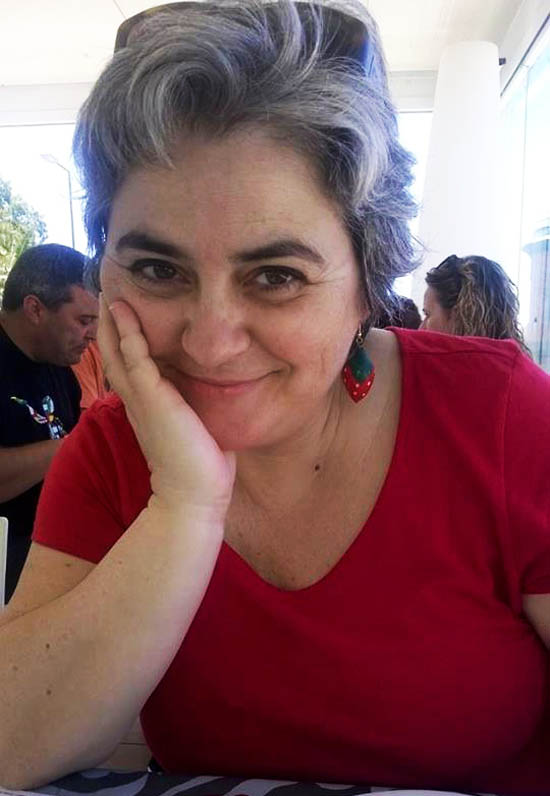 Adriana Freire Nogueira is Lecturer in Classical Literature and Culture of the Department of Arts and Humanities and and Director of the Library of the University of Algarve (Faro). Adriana is a multifaceted author, specialised in Greek literature and history, and with a special interest in the myth if Herakles, Thucydides and Plato. She has extensively worked on translations and editions of classical texts and is author of a series of children books based on the Adventures of Hercules (e.g. As verdadeiras aventuras de Hércules” e “As novas aventuras de Hércules), as well as of other fiction stories. She also ran the popular blog A Senhora Sócrates, in which she discussed classical texts in connection with modern themes and issues. Adriana was the organiser of Imagines IV: Sailing in Troubled Waters. Her publications also include: Héracles mito, história e algumas imagens», in: Mitos e Heróis. A expressão do imaginário (2012); and Concepto gramatical y musical de ‘sílaba’ en la Antigüedad y sus connotaciones actuales: análisis diacrónico, in Agora, Estudos Clásicos em Debate 19, 2017: 225-248 (with F. Garrido and M. L. Santa Barbara de Carvalho).
Adriana Freire Nogueira is Lecturer in Classical Literature and Culture of the Department of Arts and Humanities and and Director of the Library of the University of Algarve (Faro). Adriana is a multifaceted author, specialised in Greek literature and history, and with a special interest in the myth if Herakles, Thucydides and Plato. She has extensively worked on translations and editions of classical texts and is author of a series of children books based on the Adventures of Hercules (e.g. As verdadeiras aventuras de Hércules” e “As novas aventuras de Hércules), as well as of other fiction stories. She also ran the popular blog A Senhora Sócrates, in which she discussed classical texts in connection with modern themes and issues. Adriana was the organiser of Imagines IV: Sailing in Troubled Waters. Her publications also include: Héracles mito, história e algumas imagens», in: Mitos e Heróis. A expressão do imaginário (2012); and Concepto gramatical y musical de ‘sílaba’ en la Antigüedad y sus connotaciones actuales: análisis diacrónico, in Agora, Estudos Clásicos em Debate 19, 2017: 225-248 (with F. Garrido and M. L. Santa Barbara de Carvalho).
Contact: This email address is being protected from spambots. You need JavaScript enabled to view it.
Prof. Dr. Florian Freitag
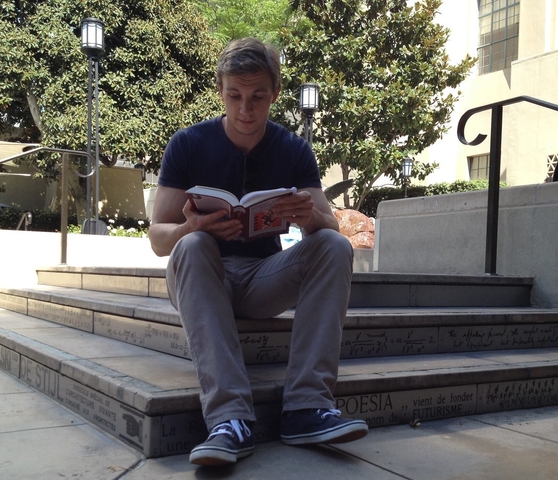 Florian is professor of American Studies at the University of Duisburg-Essen. He received his PhD in North American literatures from the University of Konstanz and also taught at the Obama Institute for Transnational American Studies at Johannes Gutenberg University Mainz. Florian is interested in North American literatures, both from the colonial period and the nineteenth century, but his main focus is on popular media, especially periodicals and theme parks. It is via popular media (and collaborations with fellow Imagines member Filippo Carlà-Uhink) that he has come into contact with classical reception, for example in joint publications such as “The Labyrinthine Ways of Myth Reception: Cretan Myths in Theme Parks” (2015), “Ancient Greek Culture and Myth in the Terra Mítica Theme Park” (2015), or “(Not so) Dangerous Journeys: The Ancient Mediterranean and Ancient Mythological Sea Travelers in European Theme Park Attractions” (2018). Florian is looking forward to engaging with classical reception in American beefcake magazines. Together with fellow Imagines member Marta García Morcillo, he is working on a project about print advertisements in American literary magazines in the future. They have both organised the interdisciplinary workshop "Multimodal Landscapes of Mediterranean Antiquity" (25-27 April 2024), which explored modern imageries of ancient pasts in the city of Essen.
Florian is professor of American Studies at the University of Duisburg-Essen. He received his PhD in North American literatures from the University of Konstanz and also taught at the Obama Institute for Transnational American Studies at Johannes Gutenberg University Mainz. Florian is interested in North American literatures, both from the colonial period and the nineteenth century, but his main focus is on popular media, especially periodicals and theme parks. It is via popular media (and collaborations with fellow Imagines member Filippo Carlà-Uhink) that he has come into contact with classical reception, for example in joint publications such as “The Labyrinthine Ways of Myth Reception: Cretan Myths in Theme Parks” (2015), “Ancient Greek Culture and Myth in the Terra Mítica Theme Park” (2015), or “(Not so) Dangerous Journeys: The Ancient Mediterranean and Ancient Mythological Sea Travelers in European Theme Park Attractions” (2018). Florian is looking forward to engaging with classical reception in American beefcake magazines. Together with fellow Imagines member Marta García Morcillo, he is working on a project about print advertisements in American literary magazines in the future. They have both organised the interdisciplinary workshop "Multimodal Landscapes of Mediterranean Antiquity" (25-27 April 2024), which explored modern imageries of ancient pasts in the city of Essen.
Contact: This email address is being protected from spambots. You need JavaScript enabled to view it.
Dr Marta García Morcillo
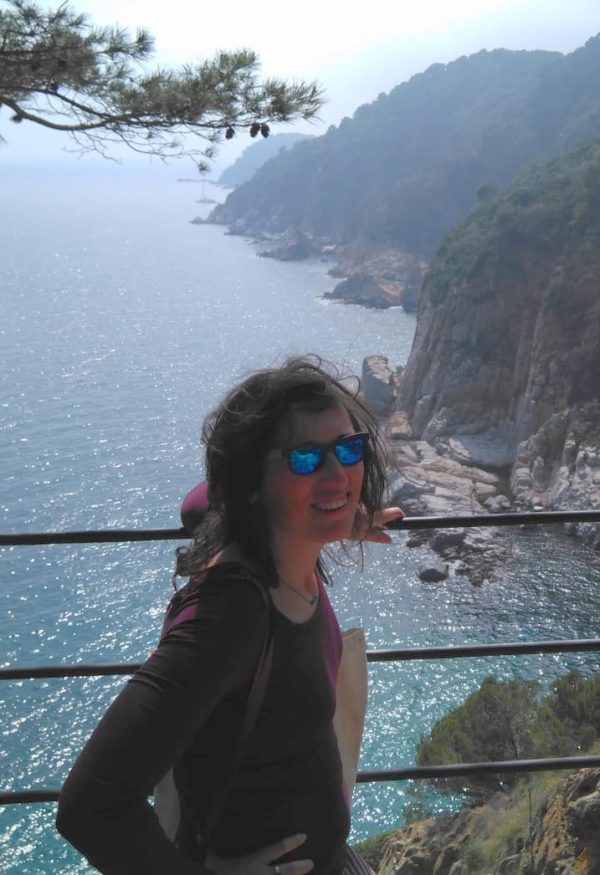 Marta is Ancient Historian and Research Fellow at Durham University. Previously, she lectured at Roehampton (London), Heidelberg, Lampeter and Dresden. Her specialisation is Roman economy and trade, as well as the Reception of Antiquity in the modern Arts, with special emphasis on cinema and advertising in the 19th and 20th centuries. Her work on printed advertising includes a cultural insight into the Liebig Trading Cards. She has also written several contributions on ancient Carthage and Carthaginian women in modern imagination. Marta is cofounder of Imagines and member of the project ANIHO, which deals with the influence of Antiquity in modern nationalisms and national identities. Her publications include the co-edition of the first Imagines volume (2008), Hellas on Screen (2008) (with I. Berti); Seduction and Power (2013); Imagining Ancient Cities in Film (2015). Along with F. Carlà and C. Walde, she has also co-edited an issue of the e-journal thersites devoted to Advertising Antiquity (2017). Together with Imagines' member Florian Freitag, she has organised the interdisciplinary workshop "Multimodal Landscapes of Mediterranean Antiquity" (25-27 April 2024), which explored modern imageries of ancient pasts in the city of Essen.
Marta is Ancient Historian and Research Fellow at Durham University. Previously, she lectured at Roehampton (London), Heidelberg, Lampeter and Dresden. Her specialisation is Roman economy and trade, as well as the Reception of Antiquity in the modern Arts, with special emphasis on cinema and advertising in the 19th and 20th centuries. Her work on printed advertising includes a cultural insight into the Liebig Trading Cards. She has also written several contributions on ancient Carthage and Carthaginian women in modern imagination. Marta is cofounder of Imagines and member of the project ANIHO, which deals with the influence of Antiquity in modern nationalisms and national identities. Her publications include the co-edition of the first Imagines volume (2008), Hellas on Screen (2008) (with I. Berti); Seduction and Power (2013); Imagining Ancient Cities in Film (2015). Along with F. Carlà and C. Walde, she has also co-edited an issue of the e-journal thersites devoted to Advertising Antiquity (2017). Together with Imagines' member Florian Freitag, she has organised the interdisciplinary workshop "Multimodal Landscapes of Mediterranean Antiquity" (25-27 April 2024), which explored modern imageries of ancient pasts in the city of Essen.
Contact: This email address is being protected from spambots. You need JavaScript enabled to view it., This email address is being protected from spambots. You need JavaScript enabled to view it.
Prof. Adeline Grand-Clément
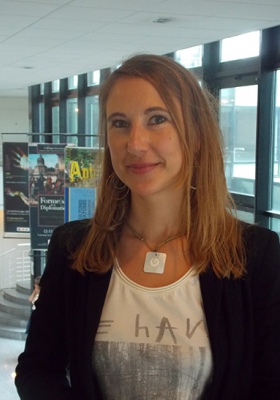 Adeline is Full Professor in Greek History at the Université de Toulouse 2-Jean Jaurès, as well member of the research group PH-ERASME (EA4601) and co-editor of the journal Anabases. Her research revolves around cultural and social history of the Archaic Greek world. She is particularly interested in the anthropology and history of colours, in sensory studies, in enviromenta humanities and in Classical Receptions in 19th century Europe. Her publications include the monographs La fabrique des couleurs. Histoire du paysage sensible des Grecs anciens (VIIIe-début du Ve s. av. n. è.), Paris, De Boccard, 2011,and Au plaisir des dieux. Expérience du sensible dans le rituels en Grèce ancienne, Toulouse, Anacharsis, 2023, as well as collective volumes such as Arcs-en-ciel et couleurs. Regards comparatifs, Paris, CNRS, 2018 (with Arnaud Dubois, Jean-Baptiste Eczet and Charlotte Ribeyrol); The Smells and Senses of Antiquity in the Modern Imagination (with Charlotte Ribeyrol), London, Bloomsbury, 2022.
Adeline is Full Professor in Greek History at the Université de Toulouse 2-Jean Jaurès, as well member of the research group PH-ERASME (EA4601) and co-editor of the journal Anabases. Her research revolves around cultural and social history of the Archaic Greek world. She is particularly interested in the anthropology and history of colours, in sensory studies, in enviromenta humanities and in Classical Receptions in 19th century Europe. Her publications include the monographs La fabrique des couleurs. Histoire du paysage sensible des Grecs anciens (VIIIe-début du Ve s. av. n. è.), Paris, De Boccard, 2011,and Au plaisir des dieux. Expérience du sensible dans le rituels en Grèce ancienne, Toulouse, Anacharsis, 2023, as well as collective volumes such as Arcs-en-ciel et couleurs. Regards comparatifs, Paris, CNRS, 2018 (with Arnaud Dubois, Jean-Baptiste Eczet and Charlotte Ribeyrol); The Smells and Senses of Antiquity in the Modern Imagination (with Charlotte Ribeyrol), London, Bloomsbury, 2022.
Contact: This email address is being protected from spambots. You need JavaScript enabled to view it.
Dr Martin Lindner
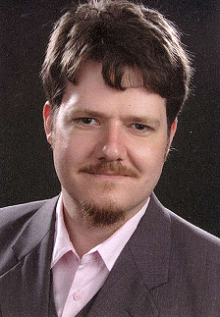 Martin Lindner is Lecturer in Ancient History at the University of Göttingen, Germany, and also curator of the Sammlung Stern, a unique film archive of documentary and educational films. He specializes in imperial Roman history, cultural history and classical reception in modern popular culture. His PhD thesis, published in 2007 (Rom und seine Kaiser im Historienfilm, Frankfurt am Main), was devoted to the representation of Roman emperors in films and TV series. He has edited and co-edited volumes on classical reception in documentaries (Drehbuch Geschichte, Münster 2005), on nationalistic classical traditions (Nationalismus und Antikenrezeption, Oldenburg 2009), on sacred prostitution (Tempelprostitution im Altertum, Berlin 2009), and on contemporary reception studies (Antikenrezeption 2013 n. Chr., Heidelberg 2013). In addition, he is co-editor of the book series Rezeption der Antike (Vandenhoeck & Ruprecht / Brill) and Imagines (Bloomsbury). He has written about 30 chapters and essays on classical reception, ranging from films, comics and novels to games, re-enactment and heavy metal music. His current projects deal with archaeology in documentary and feature films, and with classical reception in the Discworld novels by Terry Pratchett.
Martin Lindner is Lecturer in Ancient History at the University of Göttingen, Germany, and also curator of the Sammlung Stern, a unique film archive of documentary and educational films. He specializes in imperial Roman history, cultural history and classical reception in modern popular culture. His PhD thesis, published in 2007 (Rom und seine Kaiser im Historienfilm, Frankfurt am Main), was devoted to the representation of Roman emperors in films and TV series. He has edited and co-edited volumes on classical reception in documentaries (Drehbuch Geschichte, Münster 2005), on nationalistic classical traditions (Nationalismus und Antikenrezeption, Oldenburg 2009), on sacred prostitution (Tempelprostitution im Altertum, Berlin 2009), and on contemporary reception studies (Antikenrezeption 2013 n. Chr., Heidelberg 2013). In addition, he is co-editor of the book series Rezeption der Antike (Vandenhoeck & Ruprecht / Brill) and Imagines (Bloomsbury). He has written about 30 chapters and essays on classical reception, ranging from films, comics and novels to games, re-enactment and heavy metal music. His current projects deal with archaeology in documentary and feature films, and with classical reception in the Discworld novels by Terry Pratchett.
Contact: This email address is being protected from spambots. You need JavaScript enabled to view it.
Dr Charlotte Ribeyrol
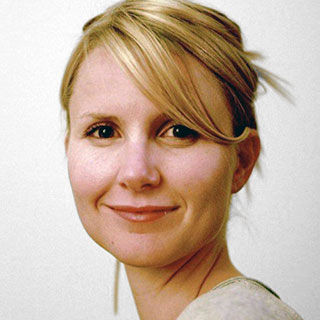 Charlotte Ribeyrol is Associate Professor in 19th century British Literature at the University of Paris-Sorbonne and Marie Sklodowska Curie Junior Research Fellow at Trinity College, Oxford (2016-18). In 2015 she was elected a junior member of the Institut Universitaire de France. Her main research focuses on Hellenism in Victorian poetry and painting, which was the subject of her first monograph: Étrangeté, passion, couleur », L’hellénisme de Swinburne, Pater et Symonds (1865-1880) (ELLUG, Grenoble, 2013). She is currently working on the cultural history of colour and chromatic materialities in 19th century art and literature. The outcomes of this research led to several publications, among them the volume The Colours of the Past in Victorian England (Peter Lang, Oxford, 2016). Further works include Antique bodies in Nineteenth-Century British Literature and Culture. (ed. with C. Bertonèche) Miranda, n°11, 2015; Late Victorian Paganism. (ed. with C. Murray) Cahiers Victoriens et Edouardiens, 2015; « Étrangeté, passion, couleur », L’hellénisme de Swinburne, Pater et Symonds (1865-1880). Grenoble, ELLUG, 2013; Inventer la peinture grecque antique. (ed. with S. Alexandre and N. Philippe) Lyon, ENS-Éditions, 2012.
Charlotte Ribeyrol is Associate Professor in 19th century British Literature at the University of Paris-Sorbonne and Marie Sklodowska Curie Junior Research Fellow at Trinity College, Oxford (2016-18). In 2015 she was elected a junior member of the Institut Universitaire de France. Her main research focuses on Hellenism in Victorian poetry and painting, which was the subject of her first monograph: Étrangeté, passion, couleur », L’hellénisme de Swinburne, Pater et Symonds (1865-1880) (ELLUG, Grenoble, 2013). She is currently working on the cultural history of colour and chromatic materialities in 19th century art and literature. The outcomes of this research led to several publications, among them the volume The Colours of the Past in Victorian England (Peter Lang, Oxford, 2016). Further works include Antique bodies in Nineteenth-Century British Literature and Culture. (ed. with C. Bertonèche) Miranda, n°11, 2015; Late Victorian Paganism. (ed. with C. Murray) Cahiers Victoriens et Edouardiens, 2015; « Étrangeté, passion, couleur », L’hellénisme de Swinburne, Pater et Symonds (1865-1880). Grenoble, ELLUG, 2013; Inventer la peinture grecque antique. (ed. with S. Alexandre and N. Philippe) Lyon, ENS-Éditions, 2012.
Contact: This email address is being protected from spambots. You need JavaScript enabled to view it.
Dr Rosario Rovira Guardiola
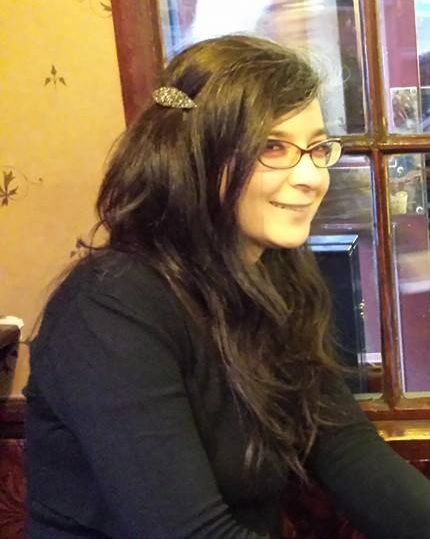 Rosario Rovira Guardiola is an Ancient Historian and Archaeologist who works at the Institute of Classical Studies, University of London, UK. She worked previously at the British Museum and was project curator for the exhibition Hadrian: Empire and Conflict and is now part of the project Pantanello: Unearthing the History of Hadrian’s Villa. Rosario is specialised in ancient trade and in the Reception of Antiquity in modern art and literature. She is the author of Museums and Literature: Marguerite Yourcenar’s Mémoires d’Hadrien, in P. Castillo et al. (eds.), Imagines, La Rioja 2008; The spell of Antinous in Renaissance Art: the Jonah statue in Santa Maria del Popolo, in S. Knippschild and M. Garcia Morcillo (eds), Seduction and Power: Antiquity in the Visual and Performing Arts (Bloomsbury 2013); Reimagining Classical antiquity: Chateaubriand in Greece, in E. Calandra and B. Adembri (eds.), Adriano e la Grecia: Villa Adriana tra Classicità ed Ellenismo (Electa 2014); “It is like Soho, Only Bigger”: Doctor Who and Modern Interpretations of Pompeii, in M. García Morcillo et al. (eds.), Imagining Ancient Cities in Film (Routledge 2015). She is also the editor of the 4th Imagines volume: Ancient Mediterranean Sea in Modern Visual and Performing Arts: Sailing in Troubled Waters (Bloomsbury 2017).
Rosario Rovira Guardiola is an Ancient Historian and Archaeologist who works at the Institute of Classical Studies, University of London, UK. She worked previously at the British Museum and was project curator for the exhibition Hadrian: Empire and Conflict and is now part of the project Pantanello: Unearthing the History of Hadrian’s Villa. Rosario is specialised in ancient trade and in the Reception of Antiquity in modern art and literature. She is the author of Museums and Literature: Marguerite Yourcenar’s Mémoires d’Hadrien, in P. Castillo et al. (eds.), Imagines, La Rioja 2008; The spell of Antinous in Renaissance Art: the Jonah statue in Santa Maria del Popolo, in S. Knippschild and M. Garcia Morcillo (eds), Seduction and Power: Antiquity in the Visual and Performing Arts (Bloomsbury 2013); Reimagining Classical antiquity: Chateaubriand in Greece, in E. Calandra and B. Adembri (eds.), Adriano e la Grecia: Villa Adriana tra Classicità ed Ellenismo (Electa 2014); “It is like Soho, Only Bigger”: Doctor Who and Modern Interpretations of Pompeii, in M. García Morcillo et al. (eds.), Imagining Ancient Cities in Film (Routledge 2015). She is also the editor of the 4th Imagines volume: Ancient Mediterranean Sea in Modern Visual and Performing Arts: Sailing in Troubled Waters (Bloomsbury 2017).
Contact: This email address is being protected from spambots. You need JavaScript enabled to view it.
Dr Luis Unceta Gómez
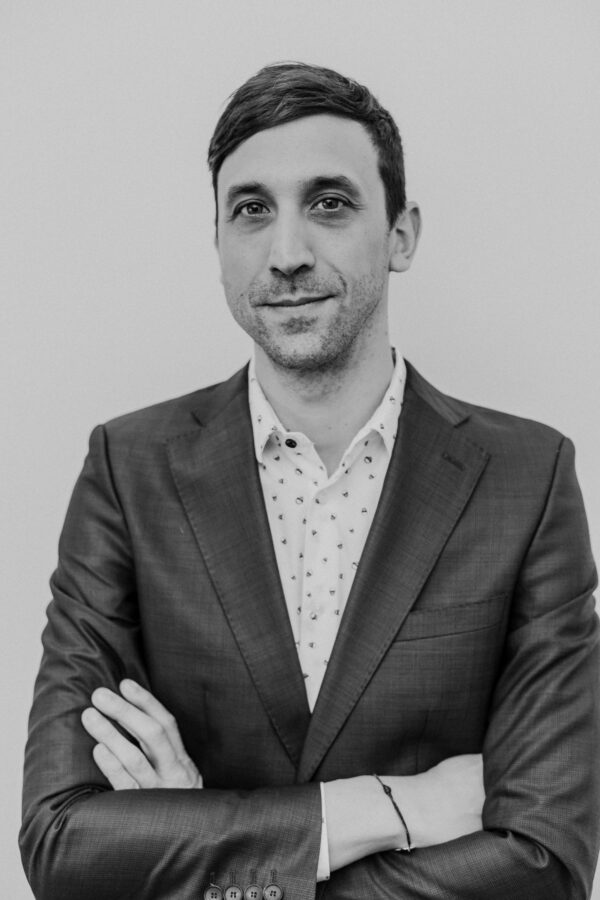 Luis Unceta Gómez is lecturer in Latin Philology at the Universidad Autónoma de Madrid (Spain). Currently, he leads the research project Marginalia Classica, dealing with the Reception of Antiquity in contemporary mass culture. He specializes in Latin Pragmatics and linguistic Politeness, and also in Classical Reception in popular culture, especially in comics, cinema, and speculative fiction. His recent publications include “From hero to superhero. The update of an archetype”, in R. López Gregoris & C. Macías Villalobos (eds.), The Hero Reloaded. The Reinvention of the Classical Hero in Contemporary Mass Media (John Benjamins, 2020, 1-17); “Sexy gory Rome. Juxtapositions of sex and violence in comic book representations of ancient Rome”, in I. Berti, M.G. Castello & C. Scilabra (eds.), Ancient Violence in Modern Imagination: The Fear and the Fury (Bloomsbury, 2020, 173-186); and “Odiseas del espacio. Reescrituras de la Odisea en la ciencia ficción”, Maia. Rivista di Letterature Classiche 72/1 (2020), 157-183. He has coedited the volume En los márgenes de Roma. La Antigüedad romana en la cultura de masas contemporánea (Catarata, 2019). Together with F. Carlà-Uhink, he organised the eighth international Imagines conference, Pagan Pornotopias (Madrid 2023).
Luis Unceta Gómez is lecturer in Latin Philology at the Universidad Autónoma de Madrid (Spain). Currently, he leads the research project Marginalia Classica, dealing with the Reception of Antiquity in contemporary mass culture. He specializes in Latin Pragmatics and linguistic Politeness, and also in Classical Reception in popular culture, especially in comics, cinema, and speculative fiction. His recent publications include “From hero to superhero. The update of an archetype”, in R. López Gregoris & C. Macías Villalobos (eds.), The Hero Reloaded. The Reinvention of the Classical Hero in Contemporary Mass Media (John Benjamins, 2020, 1-17); “Sexy gory Rome. Juxtapositions of sex and violence in comic book representations of ancient Rome”, in I. Berti, M.G. Castello & C. Scilabra (eds.), Ancient Violence in Modern Imagination: The Fear and the Fury (Bloomsbury, 2020, 173-186); and “Odiseas del espacio. Reescrituras de la Odisea en la ciencia ficción”, Maia. Rivista di Letterature Classiche 72/1 (2020), 157-183. He has coedited the volume En los márgenes de Roma. La Antigüedad romana en la cultura de masas contemporánea (Catarata, 2019). Together with F. Carlà-Uhink, he organised the eighth international Imagines conference, Pagan Pornotopias (Madrid 2023).
Contact: This email address is being protected from spambots. You need JavaScript enabled to view it.
Dr Anja Wieber
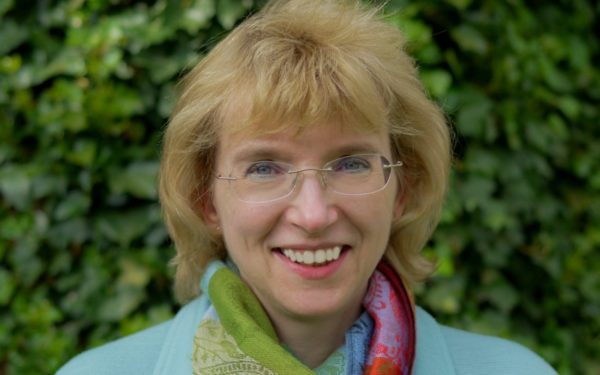 Anja Wieber is an independent scholar and secondary teacher for Latin and History at the Westfalen-Kolleg (Dortmund). Formerly she was a lecturer in Ancient History at the Universities of Bochum and Essen and a member of the research group Forschungen zur antiken Sklaverei (Akademie der Wissenschaften und Literatur Mainz) until the end of the project in 2017. As well as her expertise in the gender history of Antiquity she specialises in classical reception in all filmic genres and its media didactics, a field in which she has been writing some basic articles since the late 1990s (e.g. Film, in: Der Neue Pauly. Enzyklopädie der Antike. Rezeptions- und Wissenschaftsgeschichte, 13 (1999), 1133-1141). Besides this, she is studying all forms of reception concerning the Palmyrene Queen Zenobia, and recently also classics in advertising.
Anja Wieber is an independent scholar and secondary teacher for Latin and History at the Westfalen-Kolleg (Dortmund). Formerly she was a lecturer in Ancient History at the Universities of Bochum and Essen and a member of the research group Forschungen zur antiken Sklaverei (Akademie der Wissenschaften und Literatur Mainz) until the end of the project in 2017. As well as her expertise in the gender history of Antiquity she specialises in classical reception in all filmic genres and its media didactics, a field in which she has been writing some basic articles since the late 1990s (e.g. Film, in: Der Neue Pauly. Enzyklopädie der Antike. Rezeptions- und Wissenschaftsgeschichte, 13 (1999), 1133-1141). Besides this, she is studying all forms of reception concerning the Palmyrene Queen Zenobia, and recently also classics in advertising.
Among her numerous articles are contributions to books by members of the Imagines project (Drehbuch Geschichte, 2005, Hellas on Screen, 2008; Ancient Magic and the Supernatural in the Modern Visual and Performing Arts, 2015), to companions (-, 15. Non-western approaches to the ancient world: India and Japan – Classical heritage or exotic Occidentalism?, in: Arthur J. Pomeroy (ed.), A companion to Ancient Greece and Rome on the Screen, Malden 2017, 329-348; Roman empresses on Screen. An epic failure?, in: Elizabeth D. Carney / Sabine Müller (ed.), The Routledge Companion to Women and Monarchy in the Ancient Mediterranean World, London / New York 2021, 504-516) and to different numbers of the journal thersites. In 2020 she co-edited with Filippo-Carlà Uhink (University of Potsdam) Orientalism and the Reception of Powerful Women from the Ancient World.
Contact: This email address is being protected from spambots. You need JavaScript enabled to view it.
Visit the website Bewegte Antike to find out more about her projects, publications and initiatives.
IMAGINES is an international and cross-disciplinary research network focusing on modern receptions of Antiquity in the visual and performing arts. A key objective of the project is the understanding of different interpretations, appropriations, constructions and neglected areas of the classical inheritance across epochs, societies, cultural expressions, and movements. Subject areas under investigation include Theatre, Dance, Cinema, Opera, Sculpture, Architecture, Painting, Comics and Graphic Novels, Design, Photography, Video Games and Multimedia. The project is interdisciplinary in nature and involves scholars and artists from a wide range of fields and countries (Italy, France, Germany, New Zealand, Portugal, Spain, Austria and the UK).
IMAGINES’ most relevant collective initiatives are our bi-annual conferences. Seven European cities have hosted Imagines conferences so far: 2007 Logroño; 2010 Bristol; 2012 Mainz; 2014 Faro; 2016 Torino; 2018 Toulouse; and Göttingen in 2021. The next Imagines conference (8) will take place in Madrid in 2023.
Relevant outcomes of our network are the volumes based on our research. Thanks to a collaboration with Bloomsbury Publishing, we have created a new book series, directed by Filippo Carlà-Uhink and Martin Lindner, which hosts our conference volumes, as well as other exciting works focusing on modern visual receptions of the ancient world. Click here to find out more on the series: Imagines: Classical Receptions in the Visual and Performing arts.
The universal character of the themes and approaches that shape IMAGINES is intended to offer a basis for not only interdisciplinary debates on the impact of antiquity in the arts, but also open creative and fruitful discussions about the diversity of reception(s) in different cultural traditions.
IMAGINES aims to establish fluent dialogues and creative collaborative initiatives between academia, further education, the arts and their public. A trademark of IMAGINES is thus a collaboration with non-academic specialists and artists, who find in antiquity the inspiration for their work.
 Such collaborators have thus far included the renowned landscape gardener Fernando Caruncho (Madrid),famous graphic novelist Eric Shanower (San Diego), composer Phil Bennets (Bristol), the playwright and director Stephan Seidel (Mainz), filmmaker João Canijo (Lisbon), and photographer and cartoonist José Bandeira (Lisbon), as well as streets artists such as SEN Silva (Olhão). In 2016, we had the chance to learn about historical costume making and modelling thanks to the Turin designer and model Danielle Fiore. The Toulouse conference in 2018 included a sensory workshop organised by Les Fées Bottées, a Toulouse based cultural and professional association devoted to the production of ancient cosmetics and perfumes. In Göttingen, the conference included an event by the Spanish Street artists PichiAvo, as well as a workshop by the Italian theatre company Teatro delle Albe, from their project Non Scuola. We regard this cross-fertilisation with artists, authors and creative economies as a fundamental brand of IMAGINES; a refreshing input that aims to transcend academia and vindicate the multisided influence of Classical Reception in the building of modern cultural expressions and social identities.
Such collaborators have thus far included the renowned landscape gardener Fernando Caruncho (Madrid),famous graphic novelist Eric Shanower (San Diego), composer Phil Bennets (Bristol), the playwright and director Stephan Seidel (Mainz), filmmaker João Canijo (Lisbon), and photographer and cartoonist José Bandeira (Lisbon), as well as streets artists such as SEN Silva (Olhão). In 2016, we had the chance to learn about historical costume making and modelling thanks to the Turin designer and model Danielle Fiore. The Toulouse conference in 2018 included a sensory workshop organised by Les Fées Bottées, a Toulouse based cultural and professional association devoted to the production of ancient cosmetics and perfumes. In Göttingen, the conference included an event by the Spanish Street artists PichiAvo, as well as a workshop by the Italian theatre company Teatro delle Albe, from their project Non Scuola. We regard this cross-fertilisation with artists, authors and creative economies as a fundamental brand of IMAGINES; a refreshing input that aims to transcend academia and vindicate the multisided influence of Classical Reception in the building of modern cultural expressions and social identities.
Page 2 of 2
News & Events
-
Multimodal Landscapes of Mediterranean Antiquity. Workshop, 25-27 April 2024, Essen
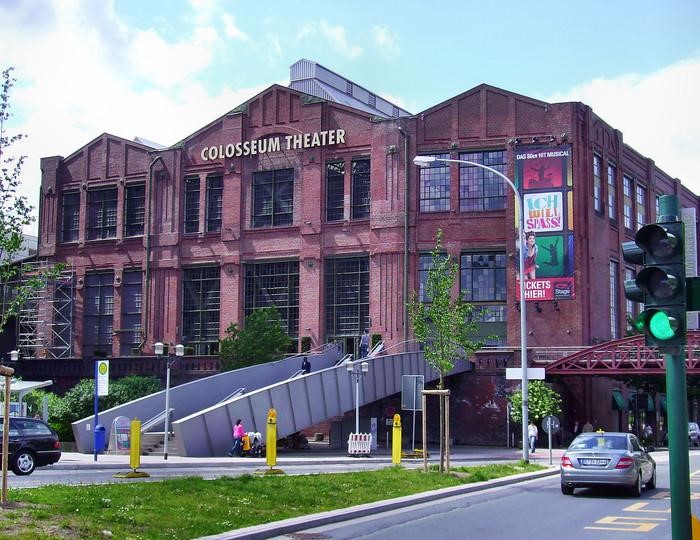
The workshop “Multimodal Landscapes of Mediterranean Antiquity” was supported by and held at the College of Social Sciences and Humanities of the Ruhr University Alliance, Essen on 25-27 April 2024. Several members of Imagines, including both organisers, participated in this exploratory event which catalogued and study existing and remembered imageries of ancient pasts in the city of Essen. Co-organised by Senior Fellow Marta García Morcillo (Durham University, UK) and her tandem partner Florian Freitag(University of Duisburg-Essen), this experimental project united researchers from different fields to investigate cultural artifacts and signs on site, including advertising, branding, photographs, and street art as well as permanent, ephemeral, and vanished architectural elements and recorded events that establish connections between ancient Mediterranean cultures and Essen’s modern cityscape (19th to 21st centuries). This pilot project will serve as a case study for an interactive...
-
News. Coming event. Imagines 8. Pagan Porntopias? Poster and Programme, Madrid 27-29 Sep. 2023
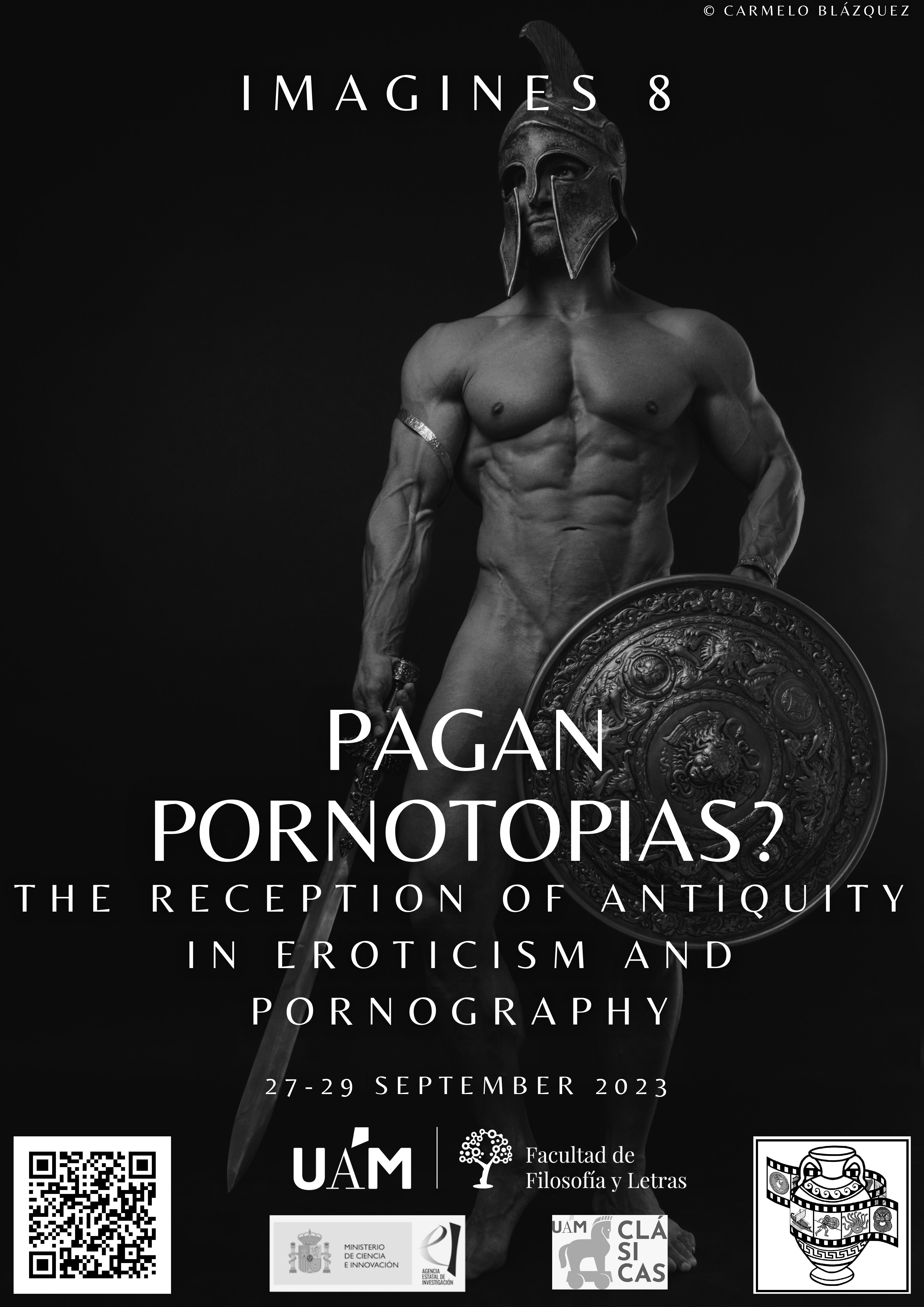
News: Imagines 8 is coming! Here the poster, programme, and information to attend: Pagan Pornotopias? The Reception of Antiquity in Eroticism and Pornography, Madrid, 27 to 29 September 2023.
-
Lecture and Workshop: Greek and Roman Antiquity for Children and Young Adults, Potsdam 5 and 7 July 2023

LECTURE GIRL TO WOMAN: THE MYTH OF PERSEPHONE IN YOUNG ADULT FICTION Cristina Salcedo González Universidad Complutense de Madrid 5th July 2023 / 18.00 CAMPUS Am Neuen Palais House 9 / Room 1.02 This lecture investigates the representation of a very popular figure from ancient myth, Persephone, in young adult fiction, analysing a series of examples from a range of anglophone cultures and contexts (New Zealand, South Africa, UK and USA). It will be shown that Persephone can represent and cover a broad range of diverse actual issues, ranging from LGBTQI+ desire to eating disorders, from partner violence to parental mental health, from PTSD to caring responsibility. Through Persephone’s example it will be shown how relevant Greek mythology still is in contemporary cul- ture – and specifically in the entertainment and forma- tion of young adults in the anglophone world. WORKSHOP GREEK AND ROMAN ANTIQUITY FOR CHILDREN AND YOUNG ADULTS 7th July 2023 / 10.00 WIS Bildungsforum Potsdam 10.00...
-
New: Imagines Book series, Vol. 14

Volume 14 of the Imagines book series announced The Reception of Cleopatra in the Age of Mass Media by Gregory N. Daugherty
-
Antiquity in silent films from the Tom Stern Collection
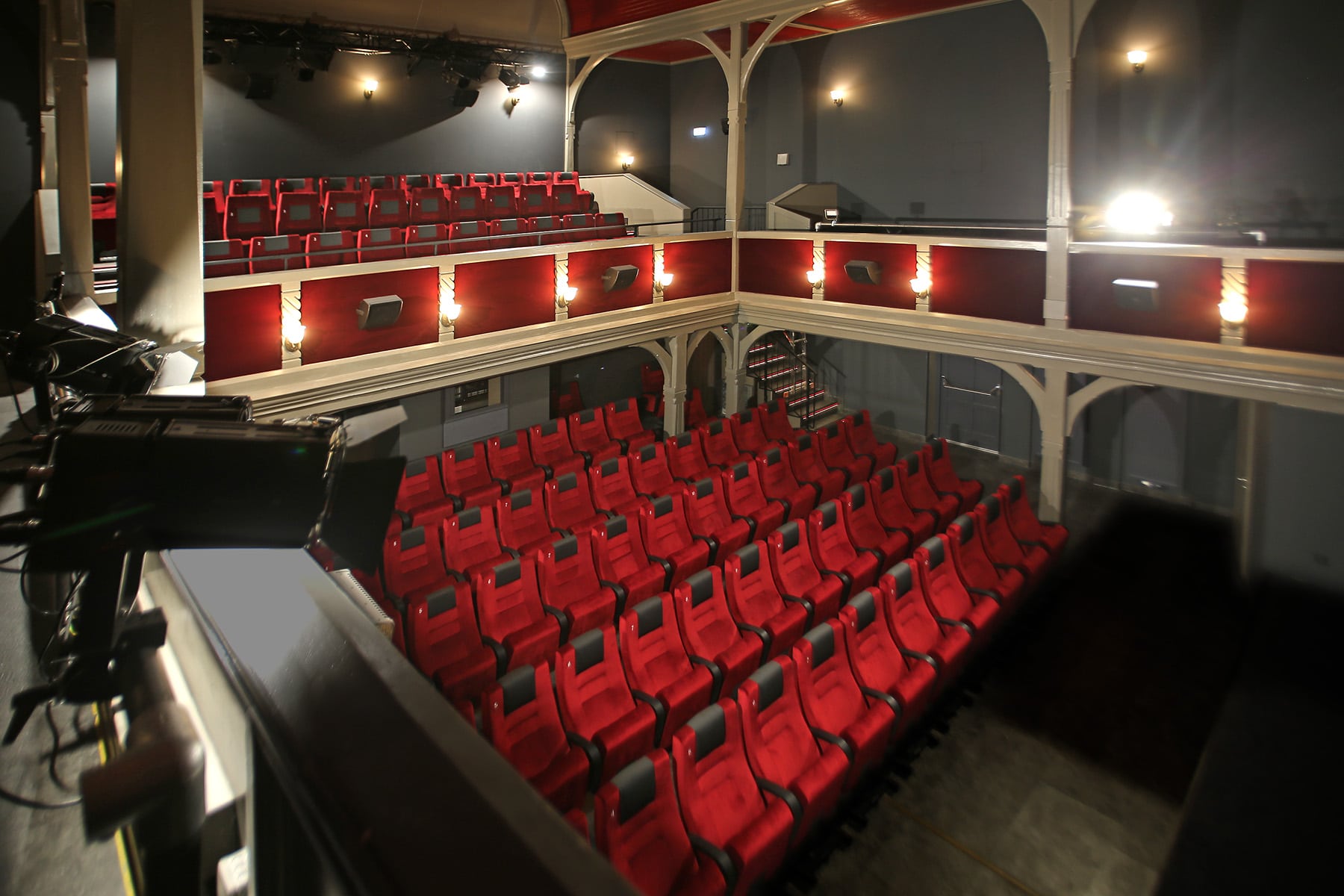
Antiquity in silent films from the Tom Stern Collection shown at the 5th Göttingen Night of Science (5 July 2022) Cinema Méliès, Göttingen
-
Conference: Performing Ancient Greek Literature in a Time of Pandemic (23-24 June 2022)
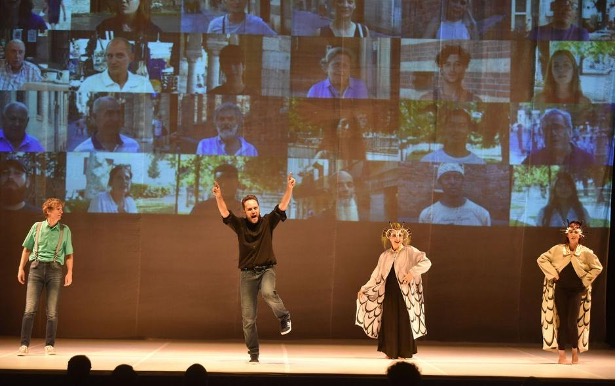
Organizers: Anastasia Bakogianni (Massey University, New Zealand) and Barbara Goff (University of Reading, UK)